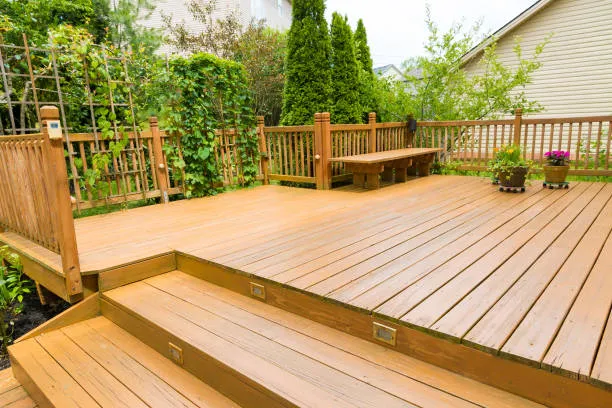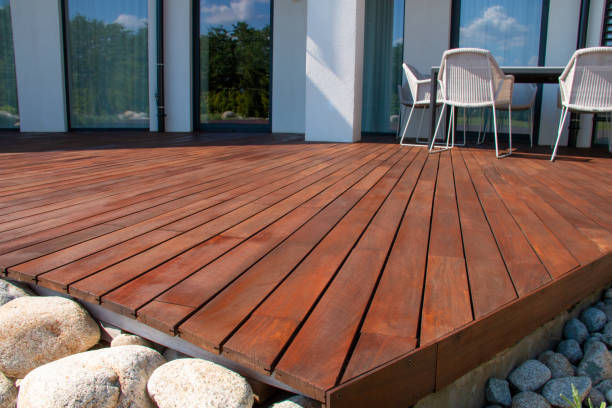
How to Choose the Right Deck Wood for Your Project?
Are you looking for the tips to choose right deck wood? Then your search ends here.
The wood you decide on for your deck is an important choice, one you want to get right to make a lasting space that’s going to look good and work well for you. But when it comes to wood, there are plenty of things to think about, from durability and appearance, to cost and maintenance needs.
We’ll help you explore the different options and figure out the Right Deck Wood for your project here.
10 Tips to Choose Right Deck Wood

1. Consider Your Budget
When selecting the Right Deck Wood, you will first want to consider your budget. There are different types of wood at different price points, and if the quality of wood is high, it’s enticing to go that route however given your project goals you should balance cost and price. It’s no surprise that high end hardwoods, such as teak or mahogany, have excellent durability and beauty, but also tend to be pricey. Cedar or pressure treated pine may still have the strength and the aesthetic you’re looking for at less cost. Your simple way to avoid overspending is to set a clear budget and only choose something within your budget range.
2. Learn about the Durability of Different Woods
Durability is a key factor when choosing the Right Deck Wood because your deck will be seen to be used harshly, if not abused, and you need to ensure that it lasts as long as possible. Highly durable and rot, weathering and insect resistant hardwoods such as ipe, mahogany, and teak are perfect for long lasting decks. Durable softwoods, such as cedar and redwood, are also in this group, but of course may need more maintenance as time goes on. Even though more expensive, pressure treated wood is protected with chemicals to thwart rot and insect damage, greatly extending its lifespan. Choose the right wood based on how much exposure and how much wear your deck will take.
3. Look for Aesthetic Appeal
Right Deck Wood can take your deck to the look and feel you are looking for! No two types of wood are the same—it’s all about the grain pattern and color; the rich, deep brown of mahogany, the golden brown of cedar. Known for their beautiful natural patterns, ipe and tigerwood are hardwoods that make your deck unique.
Choose a wood type that will complement your design it if you want a certain color or style. And because you can also stain or seal options to either enhance or change the wood's natural color, this offers you a much wider palette of aesthetics to choose from.
4. Maintenance Requirements Evaluation
It also means choosing the Right Deck Wood, but also if you want to put in the time and effort into upkeep. Relatively low maintenance hard woods—such as teak and ipe—resist rot and insects. However, they do need to be oiled, but to retain their color. Soft woods, such as cedar and pine, require resealing and staining quite regularly to keep their appearance and prevent moisture damage. May need similar treatment to keep the pressure treated woods from weathering. Select a wood type based upon how much maintenance you want and in how much time you're willing to invest in caring for your deck, based on how much maintenance you will need.
5. Factor in Climate Conditions
The Second Critical consideration while selecting the Right Deck Wood is your local climate. Wood that resists moisture, such as ipe, teak or pressure treated pine, is recommended if you live in humid or rainy areas so warping and rot are avoided. For hot and sunny areas, look to woods that won’t crack or dry out fast, such as redwood or cedar. Knowing how certain woods behave in your area’s climate will also help you know that your deck will last longer and need fewer repairs.
6. Check for Sustainability and Eco-Friendly Options
For those concerned about environmental impact, selecting the Right Deck Wood involves considering sustainable and eco-friendly options. Look for wood certified by the Forest Stewardship Council (FSC) to ensure it's harvested responsibly. Many hardwoods like ipe and teak are sourced from tropical forests, so choosing FSC-certified wood guarantees it comes from well-managed forests. Alternatively, composite or reclaimed wood can offer an eco-conscious choice with less environmental impact, although they may differ in terms of natural aesthetics.
7. Assess the Structural Needs of Your Deck
Different projects call for different levels of structural strength, so it’s essential to pick the Right Deck Wood based on how you plan to use the space. If you’re building a deck for entertaining large groups or installing heavy furniture, choose a wood known for its strength, such as ipe or pressure-treated pine. For lighter use, cedar and redwood may be sufficient, providing a balance between strength and beauty. Consider the structural needs of your deck to ensure it remains sturdy and secure.
8. Explore Composite Wood Alternatives
While natural wood is popular, composite wood can also be the Right Deck Wood for your project if you want something low-maintenance and durable. Composites are made from a mix of wood fibers and plastic, providing the look of wood without as much upkeep. They are available in a range of colors and textures, and they resist moisture, insects, and UV damage, making them an excellent choice for hassle-free decks. While they may be pricier upfront, composite decks typically require less maintenance, saving time and effort over the years.
9. Plan for Future Repairs and Replacements
And one more important thing here: the choice of the Right Wood for the Deck – the Deck Wood – is determined with the prospect of repairing or replacing it later. Hardwoods like ipe and mahogany are naturally durable, so there’s less work to do. Wood Buttresses are, however, a bit costly, but if you are using a softwood or pressure treated wood, then you need to expect occasional repairs or replacements. You will know what needs to be repaired and what needs to be replaced and this will allow you to select a wood that fits into your maintenance plans and cash flow.
10. For Best Results Get Professional Advice
Finally, when you are uncertain, ask a professional who will help you decide on the Right Deck Wood for your project. Contractors and deck specialists will know what materials would work best for your climate, budget, and what you like. They also help you through the installation, maintenance, and treatment options to get the most out of the lifespan and look of your deck. Getting expert advice will help you avoid wasting money and picking the wood that’s right for you.
Conclusion
Factors such as cost, durability, maintenance, aesthetics and sustainability come in when you choose the Right Deck Wood. Thinking about these requirements and your project idiosyncrasy will enable you to figure out a deck that is as beautiful as it is useful and durable.
No matter if you have a natural hardwood, softwood or a composite, the right wood will bring life to your outdoor area, giving you the perfect foundation to enjoy gatherings as well as relaxation and enjoyment for many years to come. Choose the best deck wood from Panipat Handloom Emporium in Delhi. Contact us today!







